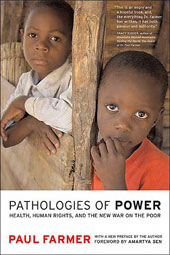 Last year I had the effrontery to write a somewhat quizzical description of Tracy Kidder's Mountains beyond Mountains, a description of Dr. Paul Farmer's medical work in impoverished Haiti and far beyond. Now that I've read Farmer's own Pathologies of Power: Health, Human Rights and the New War on the Poor I realize that my beef was with the biographer, not the subject. Kidder made of the man something of an enigma. Farmer himself seems a straight shooter -- very simply, a contemporary prophet feeling his way toward whatever libratory potential lurks, usually obscured by greed, within the technical and communications globalization to which we are all subject.
Last year I had the effrontery to write a somewhat quizzical description of Tracy Kidder's Mountains beyond Mountains, a description of Dr. Paul Farmer's medical work in impoverished Haiti and far beyond. Now that I've read Farmer's own Pathologies of Power: Health, Human Rights and the New War on the Poor I realize that my beef was with the biographer, not the subject. Kidder made of the man something of an enigma. Farmer himself seems a straight shooter -- very simply, a contemporary prophet feeling his way toward whatever libratory potential lurks, usually obscured by greed, within the technical and communications globalization to which we are all subject.Farmer would read the sentence above and jump immediately to his central message to us, the affluent, the technological insiders: "the poor" are far more subject than we are. He writes: "this book is a physician-anthropologist's effort to reveal the ways in which the most basic right -- the right to survive -- is trampled in an age of great affluence..."
The last person I knew who talked about "the poor" like that was Dorothy Day. She too made a life with and for poor persons -- and she too was convinced by experience that simply because poor persons live in need, their poverty is a more defining affliction than race, or gender, or nationality, or any of the other identity markers that those of us not afflicted with immediate acute poverty may think of as crucial to oppression. Farmer doesn't deny the ways that being a woman or living in a throwaway state can compound affliction, but he returns over and over to what he maintains is essential: people suffer because they are poor -- the forms of their suffering are epiphenomena, the poverty is their reality. And they'll tell you so if you ask; Farmer does and finds that the cross cultural understanding of misery is all too deep, whether in central Haiti, in Chiapas, or among Russian prisoners condemned to untreated, drug resistant TB.
So he counter poses to academia and our intellectual analyses what he believes is a deeper way of knowing:
Not surprisingly Farmer is profoundly critical of the market driven U.S. non-system he names "investor-owned health plans." But he is also deeply critical of most of the world's international health infrastructure. Concerns for "cost-effectiveness" and the pseudo-realism that dictates that some people are less valuable than others keep medicine from fully utilizing the wonderful capacities it acquired in the 20th century to actually heal, rather than merely care for the dying. He insists we can do more, and we must. Of the Russian epidemic of resistant TB,"...liberation theology adds something not found in any discipline, including Marxist analyses. It adds this constant interrogation: how is this relevant to the suffering of the poor and the relief of that suffering? Thus, unlike most forms of social analysis, liberation theology seeks to yoke all of its reflection to the service of the poor.
...Scholarship, including anthropology, is not readily yoked to the service of the poor. Medicine, I have discovered, is. ...Medicine becomes pragmatic solidarity when it is delivered with dignity to the destitute sick."
Farmer lists the elements of the intellectual and moral change he believes we have the technical capacity to make:"...the hypothesis that we lack sufficient means to cure all tuberculosis cases, everywhere and regardless of susceptibility patterns is not supported by the data. There is plenty of money -- even in many poor countries. "
- Make health and healing the symbolic core of the [human rights] agenda;
- Make provision of services central to the agenda;
- Establish new research agendas;
- Achieve independence from powerful governments and bureaucracies;
- Secure more resources for health and human rights.
Farmer wants a miracle; we need one, I think. He also has some experience of how we might get one that would be good for us all to attend to."In the name of 'cost-effectiveness,' we cut back health benefits to the poor, who are more likely to be sick than the non-poor. We miss our chance to heal....
"...but this is also the context of the miracle. Against a tide of utilitarian opinion and worse, we are offered the chance to insist, This is not how it should be done."
For more about an organizational effort to make the miracle come about, see Partners in Health.
Wonderful, wonderful essay/mini-bio.
ReplyDeleteA local church has been sending winter work delegations to one of the PIH clinics in Haiti, and I've always wanted to know more. Thanks so much the pointers to the book and the site.
ReplyDeleteHilzoy posts about a somewhat related issue of ideas for providing treatments -- but the wrangling she reports is a sad reflection of the lack of focus on and commitment to results.